Report on Australian Banking Commission and Accounting Theories
VerifiedAdded on 2023/06/04
|6
|1482
|73
Report
AI Summary
This report provides an analysis of a recent accounting news article concerning the Royal Banking Commission of Australia's findings. The article discusses the declining trustworthiness of Australian banks due to allegations of fraud, misconduct, and unethical behavior, leading to a loss of customer trust. The report delves into the issues highlighted by the Commission, including the exploitation of customers' lack of financial literacy through complex financial products and misleading loan practices. It applies accounting theories like stewardship and stakeholder theories to evaluate the banks' actions, concluding that the banks prioritize their growth over acting as responsible stewards. The report emphasizes the need for stronger regulations to protect consumer trust and promote transparency within the Australian financial system, including encouraging competition and improving financial literacy programs.
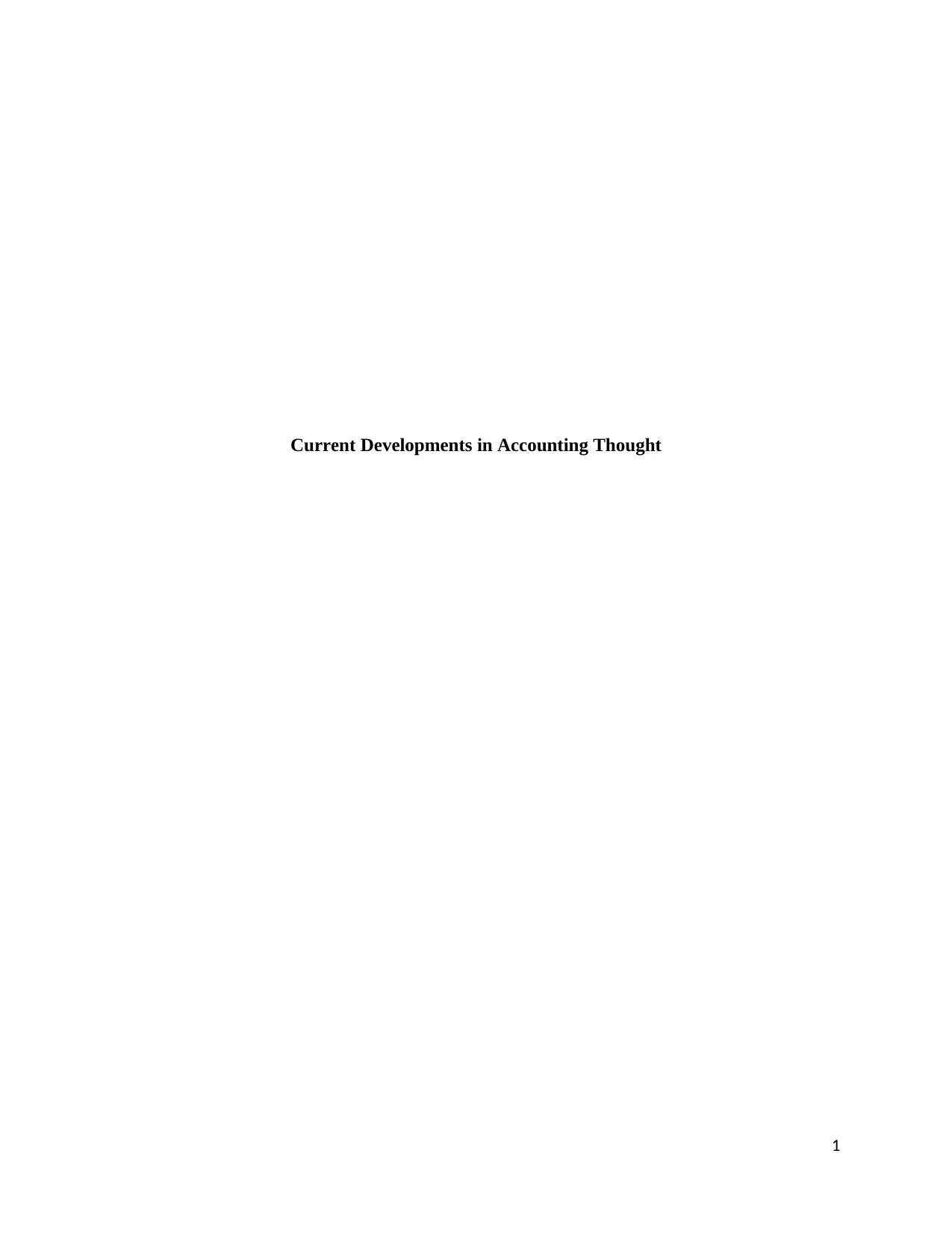
Current Developments in Accounting Thought
1
1
Paraphrase This Document
Need a fresh take? Get an instant paraphrase of this document with our AI Paraphraser
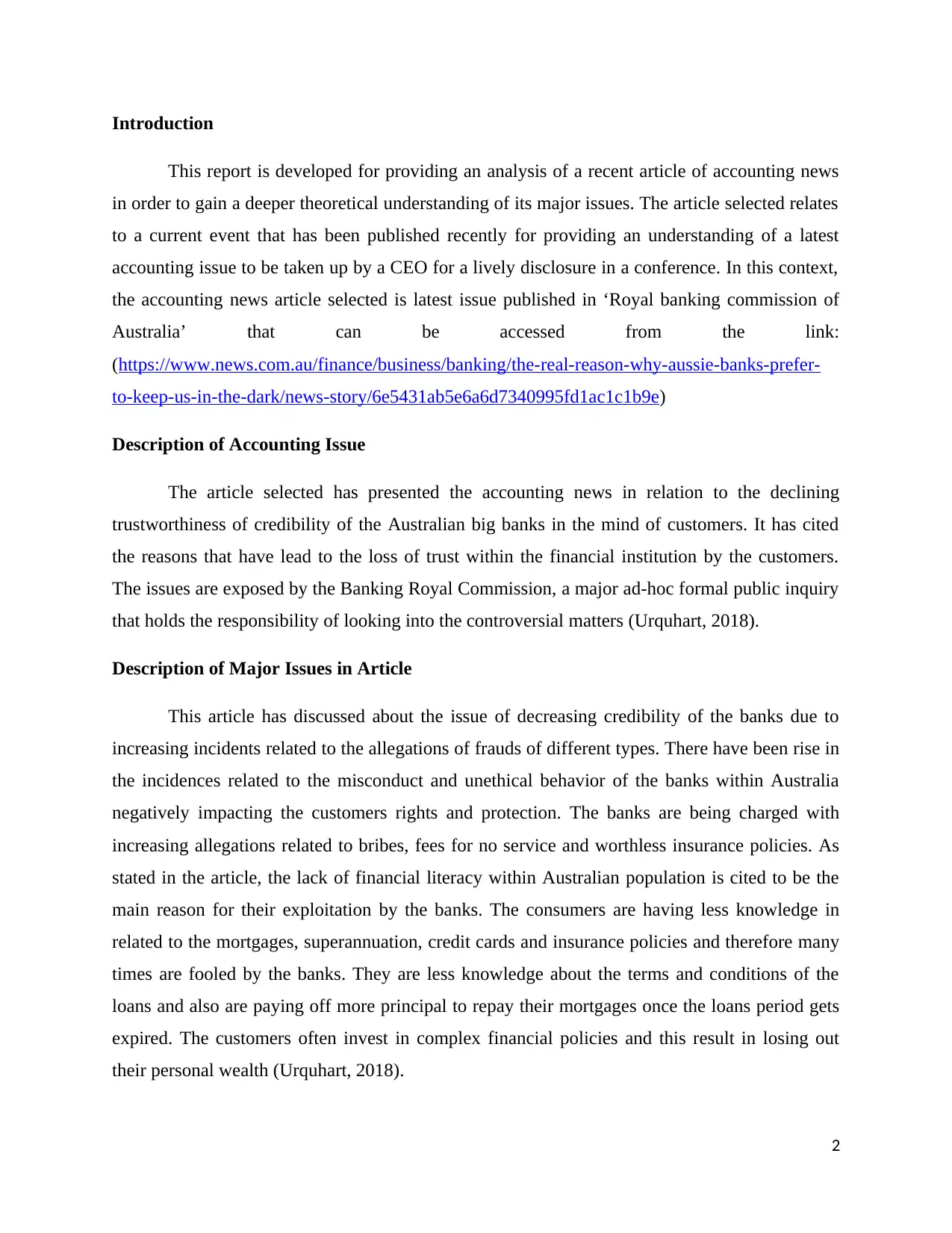
Introduction
This report is developed for providing an analysis of a recent article of accounting news
in order to gain a deeper theoretical understanding of its major issues. The article selected relates
to a current event that has been published recently for providing an understanding of a latest
accounting issue to be taken up by a CEO for a lively disclosure in a conference. In this context,
the accounting news article selected is latest issue published in ‘Royal banking commission of
Australia’ that can be accessed from the link:
(https://www.news.com.au/finance/business/banking/the-real-reason-why-aussie-banks-prefer-
to-keep-us-in-the-dark/news-story/6e5431ab5e6a6d7340995fd1ac1c1b9e)
Description of Accounting Issue
The article selected has presented the accounting news in relation to the declining
trustworthiness of credibility of the Australian big banks in the mind of customers. It has cited
the reasons that have lead to the loss of trust within the financial institution by the customers.
The issues are exposed by the Banking Royal Commission, a major ad-hoc formal public inquiry
that holds the responsibility of looking into the controversial matters (Urquhart, 2018).
Description of Major Issues in Article
This article has discussed about the issue of decreasing credibility of the banks due to
increasing incidents related to the allegations of frauds of different types. There have been rise in
the incidences related to the misconduct and unethical behavior of the banks within Australia
negatively impacting the customers rights and protection. The banks are being charged with
increasing allegations related to bribes, fees for no service and worthless insurance policies. As
stated in the article, the lack of financial literacy within Australian population is cited to be the
main reason for their exploitation by the banks. The consumers are having less knowledge in
related to the mortgages, superannuation, credit cards and insurance policies and therefore many
times are fooled by the banks. They are less knowledge about the terms and conditions of the
loans and also are paying off more principal to repay their mortgages once the loans period gets
expired. The customers often invest in complex financial policies and this result in losing out
their personal wealth (Urquhart, 2018).
2
This report is developed for providing an analysis of a recent article of accounting news
in order to gain a deeper theoretical understanding of its major issues. The article selected relates
to a current event that has been published recently for providing an understanding of a latest
accounting issue to be taken up by a CEO for a lively disclosure in a conference. In this context,
the accounting news article selected is latest issue published in ‘Royal banking commission of
Australia’ that can be accessed from the link:
(https://www.news.com.au/finance/business/banking/the-real-reason-why-aussie-banks-prefer-
to-keep-us-in-the-dark/news-story/6e5431ab5e6a6d7340995fd1ac1c1b9e)
Description of Accounting Issue
The article selected has presented the accounting news in relation to the declining
trustworthiness of credibility of the Australian big banks in the mind of customers. It has cited
the reasons that have lead to the loss of trust within the financial institution by the customers.
The issues are exposed by the Banking Royal Commission, a major ad-hoc formal public inquiry
that holds the responsibility of looking into the controversial matters (Urquhart, 2018).
Description of Major Issues in Article
This article has discussed about the issue of decreasing credibility of the banks due to
increasing incidents related to the allegations of frauds of different types. There have been rise in
the incidences related to the misconduct and unethical behavior of the banks within Australia
negatively impacting the customers rights and protection. The banks are being charged with
increasing allegations related to bribes, fees for no service and worthless insurance policies. As
stated in the article, the lack of financial literacy within Australian population is cited to be the
main reason for their exploitation by the banks. The consumers are having less knowledge in
related to the mortgages, superannuation, credit cards and insurance policies and therefore many
times are fooled by the banks. They are less knowledge about the terms and conditions of the
loans and also are paying off more principal to repay their mortgages once the loans period gets
expired. The customers often invest in complex financial policies and this result in losing out
their personal wealth (Urquhart, 2018).
2
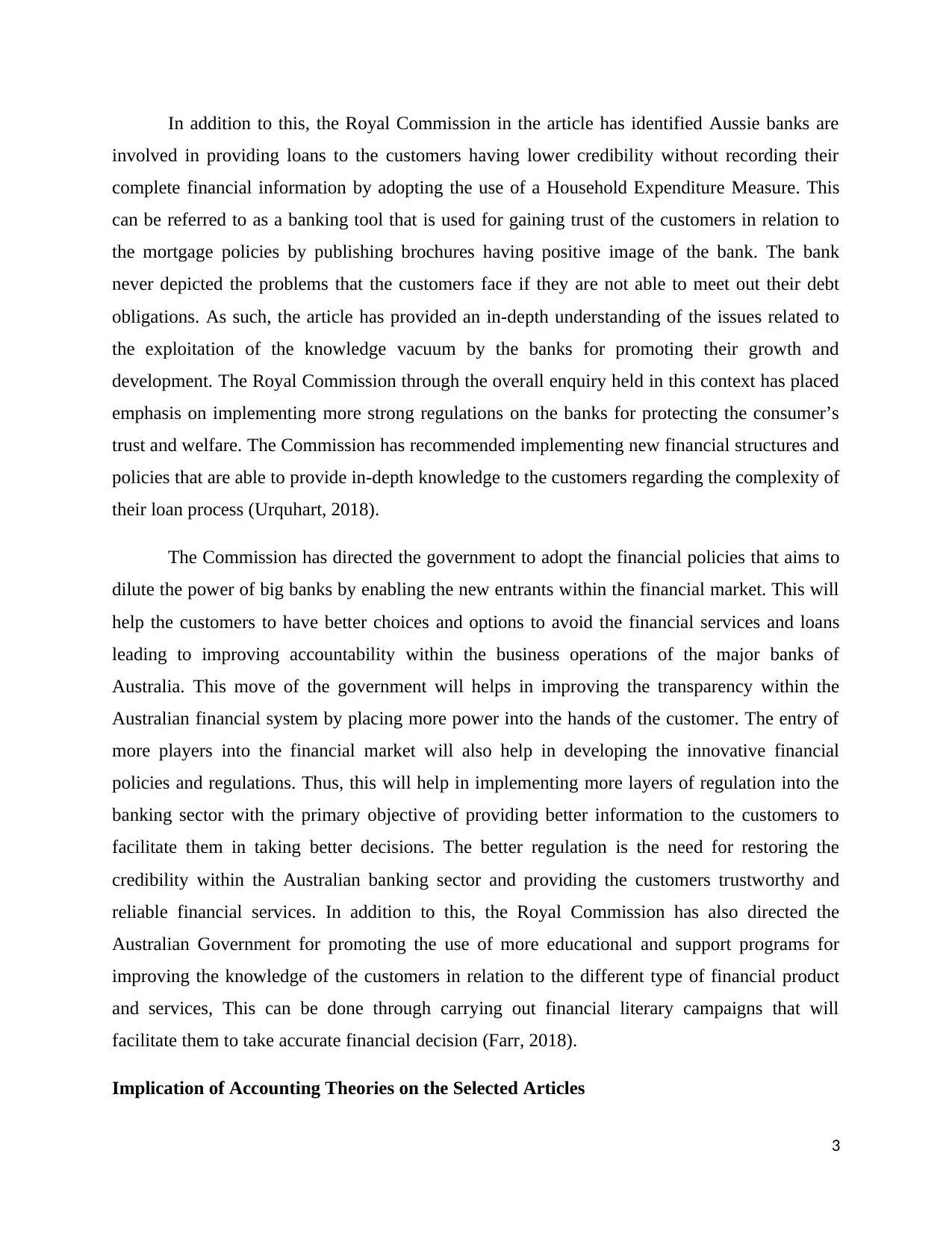
In addition to this, the Royal Commission in the article has identified Aussie banks are
involved in providing loans to the customers having lower credibility without recording their
complete financial information by adopting the use of a Household Expenditure Measure. This
can be referred to as a banking tool that is used for gaining trust of the customers in relation to
the mortgage policies by publishing brochures having positive image of the bank. The bank
never depicted the problems that the customers face if they are not able to meet out their debt
obligations. As such, the article has provided an in-depth understanding of the issues related to
the exploitation of the knowledge vacuum by the banks for promoting their growth and
development. The Royal Commission through the overall enquiry held in this context has placed
emphasis on implementing more strong regulations on the banks for protecting the consumer’s
trust and welfare. The Commission has recommended implementing new financial structures and
policies that are able to provide in-depth knowledge to the customers regarding the complexity of
their loan process (Urquhart, 2018).
The Commission has directed the government to adopt the financial policies that aims to
dilute the power of big banks by enabling the new entrants within the financial market. This will
help the customers to have better choices and options to avoid the financial services and loans
leading to improving accountability within the business operations of the major banks of
Australia. This move of the government will helps in improving the transparency within the
Australian financial system by placing more power into the hands of the customer. The entry of
more players into the financial market will also help in developing the innovative financial
policies and regulations. Thus, this will help in implementing more layers of regulation into the
banking sector with the primary objective of providing better information to the customers to
facilitate them in taking better decisions. The better regulation is the need for restoring the
credibility within the Australian banking sector and providing the customers trustworthy and
reliable financial services. In addition to this, the Royal Commission has also directed the
Australian Government for promoting the use of more educational and support programs for
improving the knowledge of the customers in relation to the different type of financial product
and services, This can be done through carrying out financial literary campaigns that will
facilitate them to take accurate financial decision (Farr, 2018).
Implication of Accounting Theories on the Selected Articles
3
involved in providing loans to the customers having lower credibility without recording their
complete financial information by adopting the use of a Household Expenditure Measure. This
can be referred to as a banking tool that is used for gaining trust of the customers in relation to
the mortgage policies by publishing brochures having positive image of the bank. The bank
never depicted the problems that the customers face if they are not able to meet out their debt
obligations. As such, the article has provided an in-depth understanding of the issues related to
the exploitation of the knowledge vacuum by the banks for promoting their growth and
development. The Royal Commission through the overall enquiry held in this context has placed
emphasis on implementing more strong regulations on the banks for protecting the consumer’s
trust and welfare. The Commission has recommended implementing new financial structures and
policies that are able to provide in-depth knowledge to the customers regarding the complexity of
their loan process (Urquhart, 2018).
The Commission has directed the government to adopt the financial policies that aims to
dilute the power of big banks by enabling the new entrants within the financial market. This will
help the customers to have better choices and options to avoid the financial services and loans
leading to improving accountability within the business operations of the major banks of
Australia. This move of the government will helps in improving the transparency within the
Australian financial system by placing more power into the hands of the customer. The entry of
more players into the financial market will also help in developing the innovative financial
policies and regulations. Thus, this will help in implementing more layers of regulation into the
banking sector with the primary objective of providing better information to the customers to
facilitate them in taking better decisions. The better regulation is the need for restoring the
credibility within the Australian banking sector and providing the customers trustworthy and
reliable financial services. In addition to this, the Royal Commission has also directed the
Australian Government for promoting the use of more educational and support programs for
improving the knowledge of the customers in relation to the different type of financial product
and services, This can be done through carrying out financial literary campaigns that will
facilitate them to take accurate financial decision (Farr, 2018).
Implication of Accounting Theories on the Selected Articles
3
⊘ This is a preview!⊘
Do you want full access?
Subscribe today to unlock all pages.

Trusted by 1+ million students worldwide
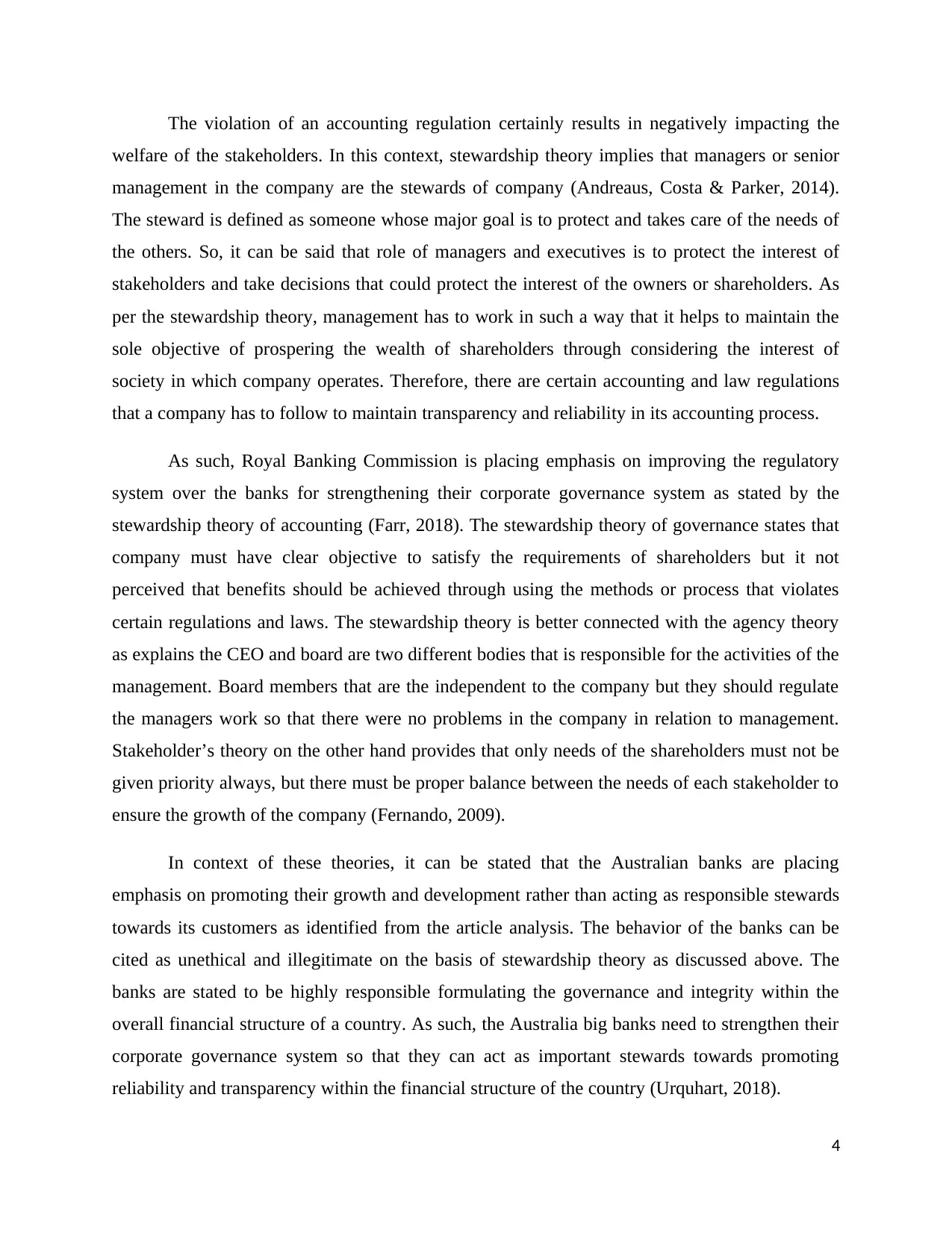
The violation of an accounting regulation certainly results in negatively impacting the
welfare of the stakeholders. In this context, stewardship theory implies that managers or senior
management in the company are the stewards of company (Andreaus, Costa & Parker, 2014).
The steward is defined as someone whose major goal is to protect and takes care of the needs of
the others. So, it can be said that role of managers and executives is to protect the interest of
stakeholders and take decisions that could protect the interest of the owners or shareholders. As
per the stewardship theory, management has to work in such a way that it helps to maintain the
sole objective of prospering the wealth of shareholders through considering the interest of
society in which company operates. Therefore, there are certain accounting and law regulations
that a company has to follow to maintain transparency and reliability in its accounting process.
As such, Royal Banking Commission is placing emphasis on improving the regulatory
system over the banks for strengthening their corporate governance system as stated by the
stewardship theory of accounting (Farr, 2018). The stewardship theory of governance states that
company must have clear objective to satisfy the requirements of shareholders but it not
perceived that benefits should be achieved through using the methods or process that violates
certain regulations and laws. The stewardship theory is better connected with the agency theory
as explains the CEO and board are two different bodies that is responsible for the activities of the
management. Board members that are the independent to the company but they should regulate
the managers work so that there were no problems in the company in relation to management.
Stakeholder’s theory on the other hand provides that only needs of the shareholders must not be
given priority always, but there must be proper balance between the needs of each stakeholder to
ensure the growth of the company (Fernando, 2009).
In context of these theories, it can be stated that the Australian banks are placing
emphasis on promoting their growth and development rather than acting as responsible stewards
towards its customers as identified from the article analysis. The behavior of the banks can be
cited as unethical and illegitimate on the basis of stewardship theory as discussed above. The
banks are stated to be highly responsible formulating the governance and integrity within the
overall financial structure of a country. As such, the Australia big banks need to strengthen their
corporate governance system so that they can act as important stewards towards promoting
reliability and transparency within the financial structure of the country (Urquhart, 2018).
4
welfare of the stakeholders. In this context, stewardship theory implies that managers or senior
management in the company are the stewards of company (Andreaus, Costa & Parker, 2014).
The steward is defined as someone whose major goal is to protect and takes care of the needs of
the others. So, it can be said that role of managers and executives is to protect the interest of
stakeholders and take decisions that could protect the interest of the owners or shareholders. As
per the stewardship theory, management has to work in such a way that it helps to maintain the
sole objective of prospering the wealth of shareholders through considering the interest of
society in which company operates. Therefore, there are certain accounting and law regulations
that a company has to follow to maintain transparency and reliability in its accounting process.
As such, Royal Banking Commission is placing emphasis on improving the regulatory
system over the banks for strengthening their corporate governance system as stated by the
stewardship theory of accounting (Farr, 2018). The stewardship theory of governance states that
company must have clear objective to satisfy the requirements of shareholders but it not
perceived that benefits should be achieved through using the methods or process that violates
certain regulations and laws. The stewardship theory is better connected with the agency theory
as explains the CEO and board are two different bodies that is responsible for the activities of the
management. Board members that are the independent to the company but they should regulate
the managers work so that there were no problems in the company in relation to management.
Stakeholder’s theory on the other hand provides that only needs of the shareholders must not be
given priority always, but there must be proper balance between the needs of each stakeholder to
ensure the growth of the company (Fernando, 2009).
In context of these theories, it can be stated that the Australian banks are placing
emphasis on promoting their growth and development rather than acting as responsible stewards
towards its customers as identified from the article analysis. The behavior of the banks can be
cited as unethical and illegitimate on the basis of stewardship theory as discussed above. The
banks are stated to be highly responsible formulating the governance and integrity within the
overall financial structure of a country. As such, the Australia big banks need to strengthen their
corporate governance system so that they can act as important stewards towards promoting
reliability and transparency within the financial structure of the country (Urquhart, 2018).
4
Paraphrase This Document
Need a fresh take? Get an instant paraphrase of this document with our AI Paraphraser
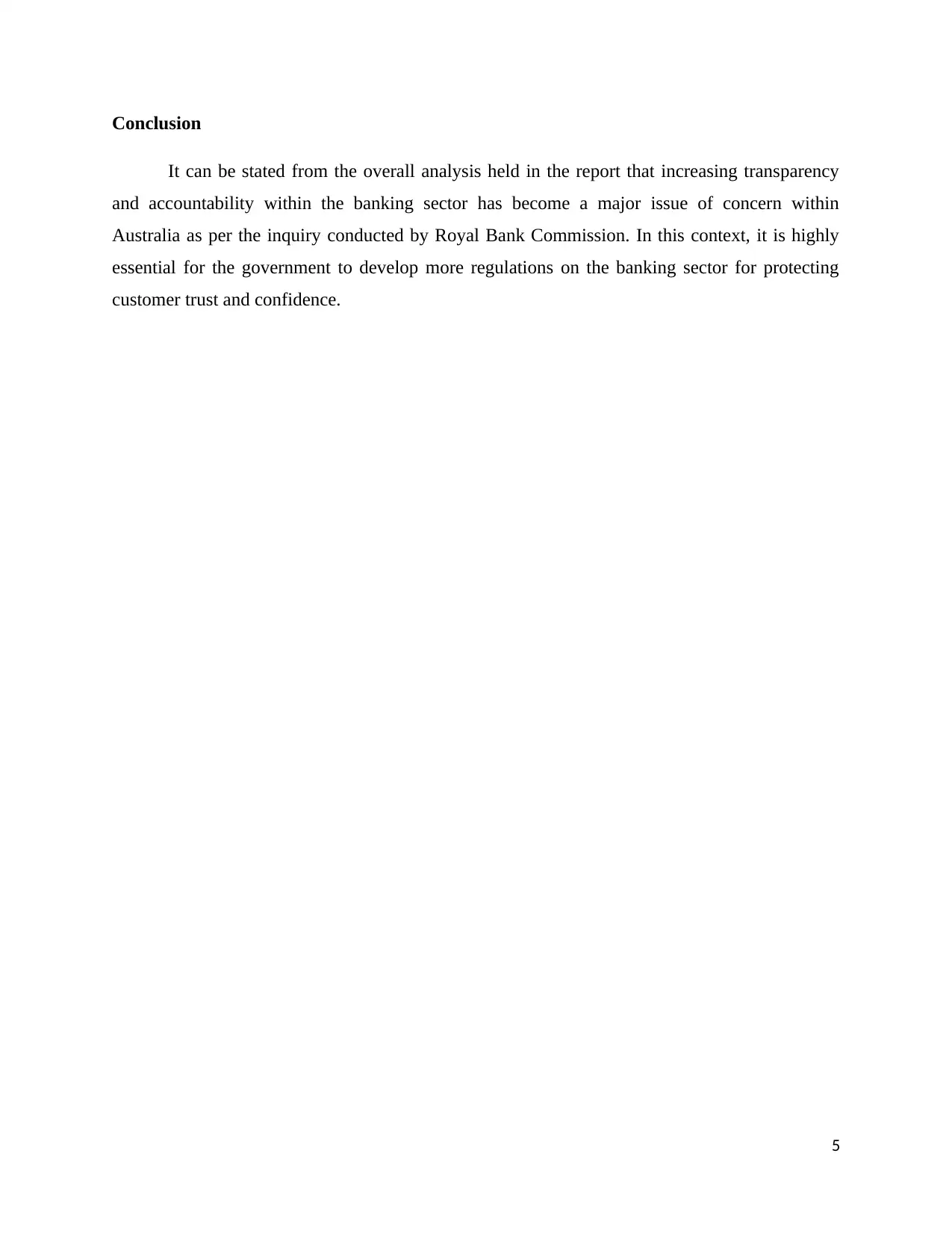
Conclusion
It can be stated from the overall analysis held in the report that increasing transparency
and accountability within the banking sector has become a major issue of concern within
Australia as per the inquiry conducted by Royal Bank Commission. In this context, it is highly
essential for the government to develop more regulations on the banking sector for protecting
customer trust and confidence.
5
It can be stated from the overall analysis held in the report that increasing transparency
and accountability within the banking sector has become a major issue of concern within
Australia as per the inquiry conducted by Royal Bank Commission. In this context, it is highly
essential for the government to develop more regulations on the banking sector for protecting
customer trust and confidence.
5
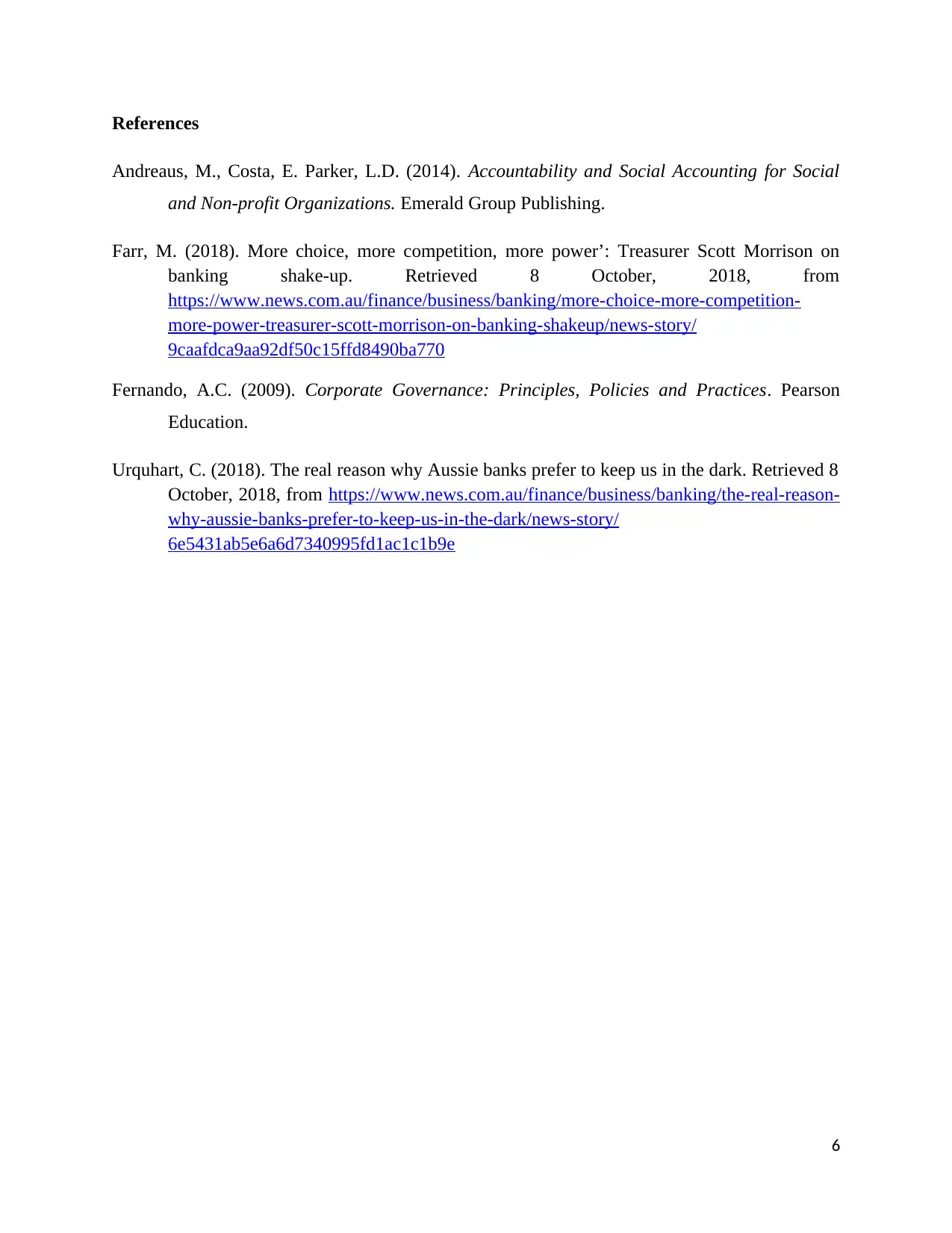
References
Andreaus, M., Costa, E. Parker, L.D. (2014). Accountability and Social Accounting for Social
and Non-profit Organizations. Emerald Group Publishing.
Farr, M. (2018). More choice, more competition, more power’: Treasurer Scott Morrison on
banking shake-up. Retrieved 8 October, 2018, from
https://www.news.com.au/finance/business/banking/more-choice-more-competition-
more-power-treasurer-scott-morrison-on-banking-shakeup/news-story/
9caafdca9aa92df50c15ffd8490ba770
Fernando, A.C. (2009). Corporate Governance: Principles, Policies and Practices. Pearson
Education.
Urquhart, C. (2018). The real reason why Aussie banks prefer to keep us in the dark. Retrieved 8
October, 2018, from https://www.news.com.au/finance/business/banking/the-real-reason-
why-aussie-banks-prefer-to-keep-us-in-the-dark/news-story/
6e5431ab5e6a6d7340995fd1ac1c1b9e
6
Andreaus, M., Costa, E. Parker, L.D. (2014). Accountability and Social Accounting for Social
and Non-profit Organizations. Emerald Group Publishing.
Farr, M. (2018). More choice, more competition, more power’: Treasurer Scott Morrison on
banking shake-up. Retrieved 8 October, 2018, from
https://www.news.com.au/finance/business/banking/more-choice-more-competition-
more-power-treasurer-scott-morrison-on-banking-shakeup/news-story/
9caafdca9aa92df50c15ffd8490ba770
Fernando, A.C. (2009). Corporate Governance: Principles, Policies and Practices. Pearson
Education.
Urquhart, C. (2018). The real reason why Aussie banks prefer to keep us in the dark. Retrieved 8
October, 2018, from https://www.news.com.au/finance/business/banking/the-real-reason-
why-aussie-banks-prefer-to-keep-us-in-the-dark/news-story/
6e5431ab5e6a6d7340995fd1ac1c1b9e
6
⊘ This is a preview!⊘
Do you want full access?
Subscribe today to unlock all pages.

Trusted by 1+ million students worldwide
1 out of 6
Related Documents
Your All-in-One AI-Powered Toolkit for Academic Success.
+13062052269
info@desklib.com
Available 24*7 on WhatsApp / Email
![[object Object]](/_next/static/media/star-bottom.7253800d.svg)
Unlock your academic potential
Copyright © 2020–2026 A2Z Services. All Rights Reserved. Developed and managed by ZUCOL.





